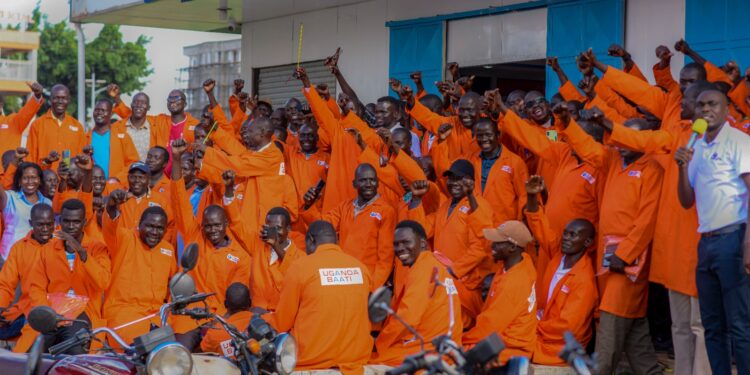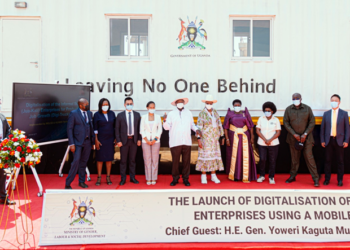Uganda Baati, under the auspices of the Safal Uganda Baati Foundation, has launched the second phase of its Economic Empowerment Skilling Program in Tororo district.
This impactful initiative, aimed at providing employable skills to out-of-school youth, reflects Uganda Baati’s commitment to nurturing a self-sufficient, empowered generation. The program’s potential reach and its holistic design have captured the attention of local leaders, stakeholders, and the Tororo community alike.
Tororo District, a densely populated area with a young demographic, faces daunting socioeconomic challenges. With nearly 373,317 individuals between 15 and 30 years old, Tororo’s youth population is one of the highest in Uganda.
However, the region’s economic landscape has failed to keep pace with this growth, leading to an alarming 62% youth unemployment rate. The district’s teenage pregnancy rate, a stark 29.5%, further exacerbates the situation, placing significant pressure on young people and families. These statistics surpass the national teenage pregnancy average of 25%, revealing an urgent need for intervention.
The devastating impact of COVID-19 has only heightened these challenges, particularly for young women, who face limited educational and economic opportunities and are vulnerable to early pregnancies and poverty.
Recognizing this, Uganda Baati is stepping forward with an intervention designed not just to address immediate economic needs but to provide young people with the tools to reshape their futures.
Launched this month, the Economic Empowerment Skilling Program is set to run for three months, targeting over 260 youth aged 16-25. The curriculum is meticulously designed to cover four key vocational skills aligned with the Safal Uganda Baati Foundation’s development pillars, including:
Backyard Gardening: Equipping young people with skills in sustainable agriculture, backyard gardening trains participants to grow food in limited spaces. This skill aims to address food insecurity while offering a practical income-generating venture. Graduates of this course will have the knowledge to manage small-scale urban farms, reducing dependency on external food sources.
Fundi Roofing: Given Uganda Baati’s expertise in construction materials, the program includes specialized training in roofing, a highly marketable skill within the construction industry. Participants will learn both theory and hands-on techniques to ensure they are ready for real-world application. Fundi Roofing opens pathways to employment or self-run roofing businesses, directly addressing youth unemployment.
Liquid Detergent Making: This component empowers youth with the ability to create and sell cleaning products. With training in safety, formulation, and marketing, participants are positioned to become micro-entrepreneurs, producing detergents for their communities. This skill responds to the growing demand for affordable cleaning solutions while fostering an entrepreneurial mindset among the youth.
Hairdressing: Addressing the personal care industry, hairdressing training equips participants with skills to open their own salons or secure employment in established ones. This skill set meets a high demand within local communities, providing a stable income source for participants and promoting local economic growth.
Beyond Technical Skills: A Holistic Approach to Youth Empowerment
Uganda Baati’s program takes a holistic approach by embedding life skills and essential knowledge alongside vocational training. Participants will engage in modules on financial literacy, ensuring they understand budgeting, saving, and basic investment principles—a skill set that will be invaluable as they transition into income-generating activities.
In addition, sexual and reproductive health education will provide young women and men with knowledge and resources to make informed decisions, addressing the region’s high teenage pregnancy rate.
Branding and Marketing skills are also part of the curriculum, as participants are encouraged to view themselves as entrepreneurs and understand the importance of presenting their skills and products professionally. Business management modules will teach participants the fundamentals of running a business, from customer relations to inventory management and growth strategies.
“Our approach goes beyond imparting skills. We’re equipping these young individuals with the mindset and tools to forge their own paths in life,” said George Arodi, Business Head of Uganda Baati. “We believe that skilling young people holistically prepares them for the dynamic demands of today’s economy. Our goal is to give them not just the skills but the confidence to succeed.”
The program has generated excitement among community leaders, parents, and local businesses, all of whom see this as a lifeline for Tororo’s youth. Uganda Baati is not just investing in individuals but is working toward building a resilient community. The initiative is expected to have a ripple effect on local households and the broader community.
Families with participating youth will benefit directly from income generated through the skills learned in the program. Additionally, with a workforce skilled in roofing, gardening, detergent making, and hairdressing, the local economy can expect a surge in small businesses and micro-enterprises that will fuel the district’s growth.
Do you have a story in your community or an opinion to share with us: Email us at editorial@watchdoguganda.com












